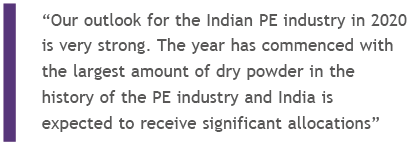Published in Asian-mena Counsel: Firms of the Year 2019 Special Report
 Aakash Choubey of Khaitan & Co discusses the development of private equity players in India with Asian-mena Counsel.
Aakash Choubey of Khaitan & Co discusses the development of private equity players in India with Asian-mena Counsel.
How has the PE/VC landscape changed over the years in India?
This year marks almost two decades of private equity in India. In that time, it has almost come through a full cycle, starting out as a minority investment player in a largely untapped economy to a key economic driver with a number of owned business. There have been ups and occasional downs, with a lot of learning in the process.
The first 10 years of private equity were slow and cautious with a limited number of PE firms opening shop in India (Warburg Pincus, General Atlantic, Blackstone and KKR being among them). Some of these were buy-out firms globally, but adopted a minority-only strategy in the initial years in India.
Having seen the lay of the land, the next 10 years witnessed ample innovation at work. KKR ramped up its credit play with a number of promoter financings, with ease of foreign law on real estate; Blackstone became the largest owner of commercial and residential real estate; Advent and Apax took controlling stakes in large Indian listed companies; and PE firms overall got comfortable with even being regarded as “promoters” of Indian companies.
Private equity in India is now a major source of capital and is a catalyst for significant M&A in the country.
What are some key trends are you seeing in the sector now and in the coming year?
We have witnessed an increased bias for buy-outs, and we consider that this trend will continue as PE becomes more confident in India. We also consider that bolt-on transactions will be on the up, and PEs would like their portfolios to become of scale, including through M&As, before exiting.
With the recent NBFC [non-bank financial company] crisis in India, we consider that private debt offerings will reduce in the short term. Investor confidence has substantially eroded. Having said this, in light of some positive judicial pronouncements, the market is almost ready for distressed debt funds to invest and bring along the eco-system and, more importantly, the mindset of turnaround.
This year should see a significant update in distressed debt play.

What are some legal or regulatory challenges for corporations within the sector?
The biggest regulatory challenge that PE buy-out firms face in India is the rule against financial assistance. Leverage is the most critical part of a private equity eco-system and drives the IRR [internal rate of return]. Indian law does not permit onshore leverage-based structures. While there are arguments on both sides, the penetration of PE in India would require India’s legislature to look at this law once again with a fresh pair of eyes.
However, a more important aspect is certainty of implementation of the laws as they stand. India has seen its fair share of blips, especially on tax and bankruptcy laws. It is critical that laws, and their interpretation, does not change frequently.
How does the firm work with PE/VC firms in navigating these challenges?
Khaitan & Co regularly acts for a number of marquee global PE firms, including Apax Partners, Advent International, Blackstone, Brookfield, Temasek, TA Associates and the like, and is at the forefront of resolving these challenges with its clients.
Having been in the profession of law for almost 110 years and having closely seen law and its practice unfold in India, we understand this landscape and help clients take practical decisions based on risks and its associated measured outcomes.
In addition to our 200-plus lawyer, partner-led PE and M&A practice, our practice offering includes a high-quality disputes resolution team, tax practice, management incentives practice, white collar crimes practice and regulatory practice, among others. We bring best-in-class talent to our clients to anticipate, find and implement solutions.
How is the PE/VC outlook for 2020?
The Indian economy faced a tough year in 2019, yet it witnessed record volume of PE deals. The aggregate value of such deals was also higher than ever before.
Our outlook for the Indian PE industry in 2020 is very strong. The year has commenced with the largest amount of dry powder in the history of the PE industry and India is expected to receive significant allocations.
In addition to general investment themes, we expect exits also to pick up in 2020, with LPs [limited partners] getting good returns on invested capital.
Reits [real estate investment trusts] and InvITs [infrastructure investment trusts] have seen substantial interest in 2019, and we expect those products to also deepen Indian capital markets, especially as avenues of PE capital.

![]() Click Here to read the full issue of Asian-mena Counsel: Firm of the Year 2019 Special Report.
Click Here to read the full issue of Asian-mena Counsel: Firm of the Year 2019 Special Report.



















